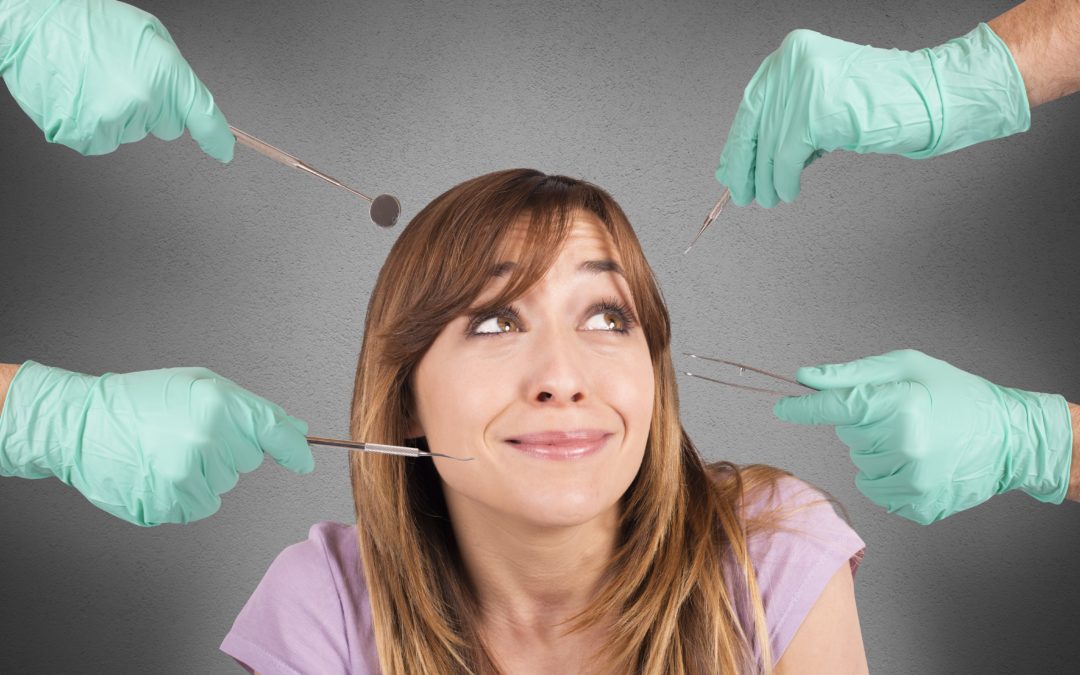You are probably thinking, “Who isn’t afraid of the dentist?”
Well you are not wrong; most people don’t exactly look forward to their dental visits. They may experience small hesitation going to the dentist, a general dislike or an outright phobia.
Just a routine exam can cause stress with some people.
But dental phobia is an entirely different animal. Dental phobias can cause extreme anxiety and prevent people from attending altogether. People with dental phobias have a much higher risk of having poor oral health and dental diseases.
So, where do these phobias come from? What causes them?
Well mostly they steam from specific events or experiences that have personally happened to them and sometimes it could be a fear that has steamed from a parent or family member. Some of these experiences may be:
- Pain: Most people who suffer from dental phobias have a fear that their dental appointment equates to pain. Something is going to hurt. That they will walk away from their appointment suffering from discomfort or sensitivity.
- Past experiences: It is very common for people that have had a bad experience in the past to avoid going back the dentist. It could be that they left the dentist in pain, they didn’t feel they had been numbed up well enough when treatment was being completed, they didn’t feel that their concerns where listened to, anything that made their visit uncomfortable.
This is particularly common with older generations, when dental technology was not as advanced as it is today.
- Needles:
Some people also have a fear of needles, and the pain they may cause. It may even be that the dentist is not what they fear but due to their fear of needles it prevents them from going to the dentist.
- Embarrassment/shame: Some people are embarrassed to allow the dentist to see the state of their mouth from fear of being judged.
So now that we know some of the causes of dental phobia, what can be done to overcome it.
Here are some suggestions that have helped our patients at Hartwell Dentistry.
1) Acknowledgement:
Sounds silly, but yep that is what we are saying, recognised that you have a phobia. This is the best way forward. Really think about why you are scared of the dentist, really understand why you hate coming to the dentist so that you can clearly communicate this to the dentist when you call them.
2) Choose the right dentist for you:
Recommendations from friends and family is always the best place to start. When you finally pick that phone up to contact the dentist, explain your concerns and apprehension about attending the dentist. Make sure the you were listened to and acknowledged and the practice offered you some solutions to helping you overcome your fear.
3) Start slow:
Baby steps. Don’t jump into having treatment done the minute you step foot in the place. If you find the right dentist your first appointment should be a thorough examination and conversation about your concerns. It should definitely not include any treatment or cleaning. Ease your way into feeling comfortable in the practice. Your dentist should spend time getting to know you, discussing with you not only ways to help with your fear but also how they can help you achieve your dental goal.
4) Sedation:
Most practices these days can offer patients some form of sedation.
For patients with slight anxiety, not so much the “full blown phobia”, a type of oral sedation can assist you in feeling more relax during your dental appointments.
For other patients the only way they can have treatment completed is by not being aware it is happening. This is where IV sedation (twilight dentistry) can really help patients with dental phobias. IV sedation is administered by an dental sedationist who carefully monitors you while your dentist completes the treatment.
At Hartwell Dentistry we have been offering IV sedation with Dr Barry Creighton for many years now. We have found through this experience, that IV sedation is a great way to build confidence back into patients trusting their dentist. We have even had some patients that now have so much trust and confidence in our dentist that they no longer require sedation for any dental treatment.
5) Distractions:
Find a dentist that has the facilities to offer their patients a movie to watch or music to listen to. Sometimes all it takes is simple distraction from the noise and sounds of a dental clinic to help relax and calm you.
6) Technology:
Attending a practice that stays abreast of improvements in techniques and equipment will help make your dental visit comfortable.
For example, here at Hartwell Dentistry, we utilise the ‘Wand’ a computer driven anaesthetic delivery system which removes the fear of needles.
Remember, dental technology is so much more advanced than it once was.
It is important to start your children’s dental visits at an early age so that they can develop a healthy and trusting relationship with their dentist.
We believe that prevention is better than cure. Attending your dentist at the recommended return date will help us identify your concerns at their early stages and even prevent issues from occurring all together.
At Hartwell Dentistry we are passionate about helping all patients get to not only dental health but overall health as well.

